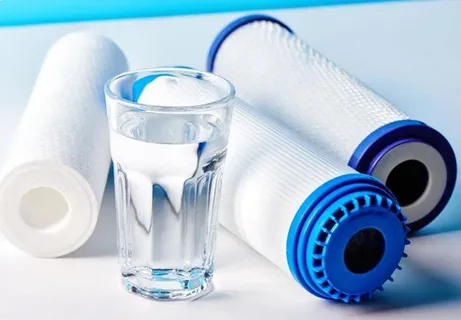Water is essential for life, and having access to clean, safe drinking water should never be an afterthought. That’s where Water Filters come into play. These handy devices improve the taste of your tap water and remove harmful contaminants that could affect your health. However, just like any other appliance in your home, a water filter requires regular maintenance to function at its best. Whether you rely on a pitcher filter or an elaborate under-sink system, understanding how to maintain it can make all the difference in ensuring optimal performance.
How Often Should You Replace Your Water Filter?
Knowing how often to replace your water filter is crucial for maintaining its effectiveness. Generally, it’s recommended to change the filter every 6 to 12 months, but this can vary based on usage and water quality. If you notice a decrease in water flow or an unusual taste, it might be time for a change sooner than expected. High sediment levels or heavy use may require more frequent replacements.
Different types of filters have distinct lifespans. For instance, reverse osmosis systems might need replacement every two years, while pitcher filters typically last about three months. Always check the manufacturer’s guidelines specific to your model for accurate timing. Keeping track of when you last replaced the filter will help ensure you consistently drink clean and safe water.
Signs that Your Water Filter Needs Maintenance
Water-Filters are essential for ensuring clean, safe drinking water. However, they don’t last forever without some attention. One clear sign that your filter needs maintenance is a change in taste or odour. If you notice any unusual flavours or smells coming from your tap water, it’s time to check the filter.
Another indicator is decreased water flow. Slow dispensing can signal a clogged filter that requires cleaning or replacement. Also, look for discolouration. Any changes in the clarity of filtered water could mean contaminants are getting through. Don’t forget about warning lights on filtration systems equipped with monitoring features. These alerts provide timely reminders when upkeep is needed. If you experience frequent leaks near the unit, this could indicate a failed seal and that maintenance might be due soon.
Steps to Clean and Maintain Your Water Filter for Home
Cleaning your Water Filter for Home doesn’t have to be a daunting task. Start by turning off the water supply and disconnecting the filter from its source. This ensures safety as you begin the maintenance process. Next, remove any cartridges or components that can be washed separately. Rinse them under warm water to eliminate dirt and residue.
Consider using a mild soap solution for deeper cleaning, but ensure all soap is thoroughly rinsed afterwards. After that, inspect each part for wear or damage. If anything looks worn out, it’s time for a replacement. Once everything is dry and clean, reassemble it, ensuring tight connections to prevent leaks. Run fresh water through the system before use to flush out any remaining impurities or loose particles from cleaning. Regularly following these simple steps will keep your water filter functioning at its best and provide safe drinking water.
Different Types of Water-Filters and Their Maintenance Requirements
Water-Filters come in various types, each with unique maintenance needs. Understanding these differences is crucial for optimal performance. Activated carbon filters are popular for removing impurities and improving taste. Depending on usage, they generally require cartridge replacement every 2-6 months. Reverse osmosis systems are more complex. The membrane should be regularly checked and replaced every 2-3 years. Flushing the system helps maintain water quality.
Ultraviolet (UV) filters use light to eliminate bacteria but need bulb replacements yearly. Ensure that the quartz sleeve remains clean for effective operation. For pitcher filters, cartridges must be replaced every month or two. Watch for changes in flow rate as a sign of filter saturation. Under-sink models often have multiple stages requiring different maintenance intervals—check manufacturer instructions to stay on track!
The Role of Regular Maintenance in Extending the Life of Your Water Filter
Regular maintenance is crucial for keeping your water filter in top condition. Neglect can lead to reduced efficiency and premature failure like any other appliance. When you maintain your water filter, you’re ensuring that it operates as designed. This means cleaner, safer drinking water for you and your family. A well-maintained filter also minimizes the risk of harmful contaminants slipping through.
Routine checks prevent clogs and blockages that could strain the system. Replacing or cleaning filters according to the manufacturer’s guidelines can enhance performance and significantly extend the system’s lifespan. Additionally, regular upkeep helps identify potential issues before they escalate into costly repairs or replacements. It’s a proactive approach that pays off in the long run. Investing time in maintenance now translates into savings later while guaranteeing access to clean water whenever needed.
Common Mistakes to Avoid When Maintaining Your Water Filter
Maintaining your water filter can be straightforward, but common mistakes can hinder performance. One major error must be addressed in adhering to the manufacturer’s guidelines for replacement and cleaning schedules. Each filter has specific needs; ignoring these can lead to decreased efficiency. Another frequent oversight is using the wrong cleaning agents. Harsh chemicals may damage components or leave residues that contaminate filtered water. Stick with mild solutions recommended by the manufacturer.
Some users also need to remember to inspect their filters regularly. A quick visual check can reveal leaks or damages that require immediate attention. Many people need to pay more attention to properly storing filtered water. Leaving it in direct sunlight or not sealing containers properly can significantly affect quality. Taking small steps ensures your system runs effectively and keeps your drinking water safe.
The Benefits of Regularly Maintaining Your Water Filter
Regular water filter maintenance is essential for ensuring clean and safe drinking water. Keeping it in top shape can significantly reduce contaminants that may compromise your health.
Improved Water Quality
Regular water filter maintenance ensures that it effectively removes impurities, such as chlorine, sediment, bacteria, and heavy metals. Over time, filters can become clogged with contaminants, diminishing their ability to purify water. Cleaning or replacing the filter consistently ensures that your water remains clean, fresh, and safe for consumption, reducing the risk of ingesting harmful substances and maintaining high water quality.
Extended Filter Lifespan
Proper maintenance helps prolong the life of your water filter, saving you money in the long run. Filters that are not regularly cleaned or replaced can degrade faster, leading to a need for more frequent replacements. By following manufacturer recommendations for maintenance, such as rinsing or replacing the filter at the right intervals, you maximize the filter’s efficiency and prevent premature wear and tear, thus extending its usable life.
Increased Efficiency and Performance
A well-maintained water filter operates at peak efficiency, ensuring optimal performance. When filters are clogged with debris or have exceeded capacity, they may slow the filtration process, reducing water flow or making filtration less effective. Regular upkeep ensures the filter functions fully, providing quick access to clean water without delays or reduced water pressure.
Cost-Effective Water Filtration
By maintaining your water filter regularly, you can avoid expensive repairs or replacements that result from neglect. Filters that need to be properly cared for can malfunction or become damaged, leading to costly fixes or the need to purchase entirely new systems. Regular maintenance, such as cleaning, replacing filter cartridges, and checking for leaks or damage, ensures that your filtration system works effectively, offering reliable and cost-efficient water purification for your home or business.
Why is it important to maintain your Best Water Purifier?
Maintaining your Best Water Purifier is crucial for ensuring clean and safe drinking water. Over time, filters can become clogged with impurities, reducing their effectiveness. This means the quality of water you consume may remain the same. Regular maintenance helps to eliminate harmful contaminants that could pose health risks. When a filter isn’t properly cared for, bacteria and other pathogens can thrive in stagnant water.
Additionally, neglected filters can lead to unpleasant tastes or odours. People want to avoid sipping on foul-tasting water; it ruins the experience. Another key reason is cost-effectiveness. Replacing a damaged or inefficient filter often costs more than maintaining it regularly. Consistent upkeep extends the lifespan of your filtration system, saving you money in the long run while ensuring access to fresh-tasting water every day.
Cleaning and replacing the filter cartridges
Cleaning your water filter cartridges is vital to ensure clean, great-tasting water. Depending on your filter type, some cartridges can be cleaned and reused multiple times. Washable cartridges are gently rinsed under warm running water to remove trapped particles or sediment. Avoid using harsh chemicals that could compromise their integrity. When it’s time for replacement, follow the manufacturer’s guidelines for frequency. Most filters need changing every three to six months, but look for taste or flow rate changes as indicators.
Always check the connections when replacing a cartridge to ensure everything fits snugly. Proper installation prevents leaks and ensures optimal filtration performance. Regular maintenance helps maintain quality and peace of mind, knowing your drinking water is safe and pure.
Checking and adjusting the water pressure
Water pressure plays a crucial role in the effectiveness of your water filter. If the pressure is too high, it can strain the system and lead to premature wear. Conversely, low water pressure may prevent optimal filtration. Use a gauge attached to an outdoor faucet or laundry sink to check your water pressure. The ideal range for most home systems is typically between 40 and 60 psi.
If your water pressure is outside this range, consider making adjustments. You should install a pressure regulator if it’s too high. On the other hand, low-pressure issues could stem from clogged pipes or filters that need replacement. Regularly monitoring and adjusting your water pressure ensures that your filter operates efficiently. This step enhances performance and extends the lifespan of your unit.
Flushing the system
Flushing the system is crucial in maintaining your water filter’s performance. This process helps clear out any accumulated contaminants and ensures clean drinking water. Start by turning off the water supply to your filter. Open the faucet or spout connected to it, allowing any remaining water to drain completely. Once empty, reopen the supply and let freshwater flow through for several minutes.
This action dislodges pollutants that may have settled within the filtration system. It also refreshes your filter media, keeping it effective for longer periods. Make this flushing routine part of your maintenance schedule. Depending on usage, doing it every month can significantly enhance filtered water’s efficiency and taste. Regular flushing minimizes buildup and prolongs your unit’s longevity while consistently ensuring optimal output.
Inspecting for leaks and damages
Inspecting your water-filter for leaks and damages is crucial for optimal performance. A small leak can lead to significant water waste and reduced efficiency. Start by examining the connections between the filter and the plumbing. Look for any moisture or dripping signs indicating a loose connection or damage. Tightening fittings may resolve minor issues. Next, check the filter’s body. Cracks or wear over time can compromise its integrity.
If you spot any visible cracks, it might be time to replace that component. Remember the hoses and tubes connected to your system. They should be free from kinks or abrasions that could impede flow. Perform these checks regularly as part of your maintenance routine. This proactive approach will help keep your water clean and ensure longevity in performance.
Proper storage of filtered water
Proper storage of filtered water is essential for maintaining its quality. Always use clean, food-grade containers to avoid contamination; glass- or BPA-free plastic bottles are ideal. Store your filtered water in a cool, dark place. Direct sunlight can promote algae growth and degrade the container material over time. Keep the lid tightly sealed to prevent unwanted particles from entering the container.
Also, regularly check your storage vessels for signs of wear or damage. Use fresh filtered water within a reasonable timeframe—ideally within one week—to ensure optimal taste and safety. If you notice any off-flavours or odours, it’s best to discard that batch. Labelling your containers with dates will help you keep track of freshness. This simple step ensures you’re always drinking safe and clean water without guesswork.
Conclusion
Regular Water Filters maintenance is crucial for ensuring its optimal performance and providing clean, safe drinking water. By following these simple tips, you can prolong the life of your filter and enjoy the benefits of fresh, filtered water. Remember to replace your filter cartridge according to the manufacturer’s instructions and to store your filtered water to maintain its quality properly. With proper care and maintenance, your water filter will continue to provide you with clean, great-tasting water for years.
FAQs
How often should I replace my water filter cartridge?
The frequency of replacing your filter cartridge will depend on your filter type and the amount of water you use. Most manufacturers recommend replacing the cartridge every 3-6 months, but it’s best to consult your specific product manual for more accurate instructions.
Can I clean my water filter instead of replacing it?
Some filters can be cleaned and reused, but most are designed to be replaced. Check your product manual for specific cleaning instructions; if they don’t mention cleaning, it’s best to replace the filter.
What happens if I don’t maintain my Water Filters?
If you maintain your Water Filters, its performance will stay the same over time. This can decrease water quality and taste and cause clogs or malfunctions in the filter system.
Can I store filtered water in any container?
Filtered water should be stored in food-grade containers, such as glass or BPA-free plastic bottles, to avoid contamination.
How long can I store filtered water before it goes bad?
Filtered water should be consumed within one week for optimal taste and safety. If you notice any off-flavors.
| Related Business Listings |
| Contact Directory |
| Local Business Profiles |




